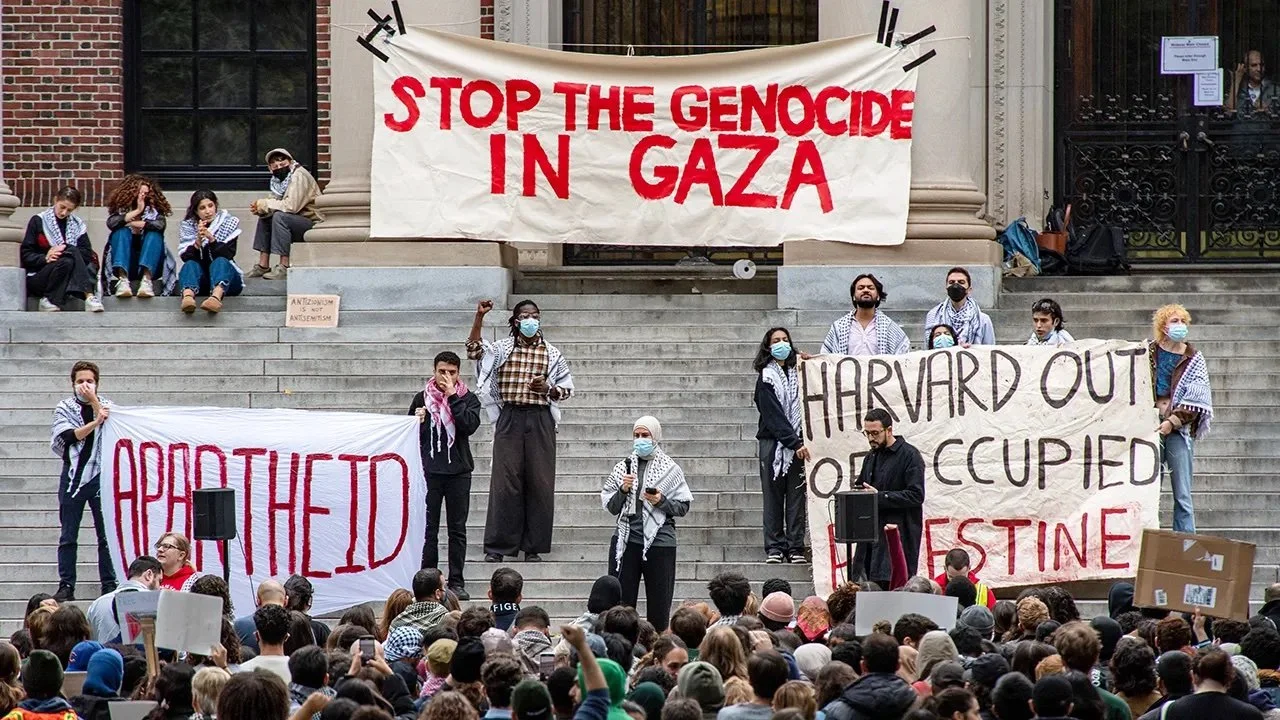Harvard’s Hamas Problem
Picture via Getty Images
BRIAN KAYE: News of Harvard’s student-released letter focusing on the October 7 Hamas attacks has quickly circulated around the country. The anonymous publication, which stated that the Israeli government was at fault for the actions of the terrorist group, has been heavily criticized by those inside and outside the school alike. While freedom of speech is a fundamental human right, Harvard could have done more to denounce the letter, which had insensitive undertones during a widespread period of mourning.
The perennial Israeli-Palestinian conflict has been unfolding for several decades now, and shows no obvious signs of slowing down. After the latest Hamas attacks on October 7, passionate viewpoints on the situation in Gaza have again come to the forefront of the international stage.
As is often the case with such relevant global topics, discussions and protests surrounding the dispute have sprung up on campuses across the U.S., causing quite the stir at numerous well-known universities, including Harvard. Already one of the most notable colleges in the country, the recent events at Harvard have garnered a fresh wave of negative attention towards the school.
Shortly after the tragic October 7 attacks, a coalition of more than 30 student groups at the university released an anonymous open letter claiming that Israel was “entirely responsible” for any violence resulting from Hamas’s actions. This and other controversial takes in the letter proved to greatly anger and perturb many Harvard higher-ups, including professors, advisors, and important donors.
While many were quick to label the letter as hateful and anti-semitic, the Harvard administration presented a somewhat passive stance on the issue, refusing to take down the anonymous publication from the university’s domain. In a statement released by the university, Harvard president Claudine Gay said that “Our University rejects hate,” while adding that the school “embraces a commitment to free expression.”
Following the letter and Harvard’s unassertive response, some chose to cut ties with the university altogether. Perhaps the most notable of these protests was by the Israeli billionaire couple Idan and Batia Ofer, two former members of a Harvard executive board. The couple stated that “our faith in the University’s leadership has been broken and we cannot in good faith continue to support Harvard.”
Although Harvard’s lack of action was heavily criticized, many still debate if the university’s decision was ultimately correct. Was Harvard right to uphold their freedom of speech policy? Is there a line as to what opinions can and cannot be allowed on campus forums?
While freedom of speech remains a fundamental right for all Americans, Harvard probably should have at a minimum done more to discredit the letter. While there is nothing wrong with sharply criticizing the numerous appalling and unjustifiable actions of the Israeli government towards innocent Palestinians and passionately promoting Palestinian freedom, the letter that was published was not solely composed of these viewpoints.
The anonymous publication disregarded the actions of Hamas, an organization that facilitated the murder of over 800 Israeli civilians. The letter failed to condemn a terrorist group that has released numerous anti-semitic threats aimed at Jewish people, not just the Israeli government.
So, should Harvard have taken the publication down? Since the letter was released on a Harvard-run forum, campus administration very well has the right to do so. A university is a controlled environment, and much like other controlled environments such as private firms and secondary schools, entering college requires you to enter into a social contract.
In secondary school, if you use expletives or use harmful language towards other students, you are liable to be reprimanded, or even expelled. In a job, you could be fired. In both of these scenarios, you are agreeing to have your freedom of speech slightly infringed upon so that you may gain other benefits, such as an education or income. The same applies to numerous other settings in society, including institutions of higher education.
Campuses are meant to be safe and regulated environments to prepare students to enter the real world — a reality that students expect when enrolling in any university. Insensitive opinions on college forums have the potential to weaken this regulated environment, no matter which viewpoints they are advocating. Freedom of speech enables you to say or publish whatever you choose in the outside world, but while on campus, these rules do not necessarily apply.
Brian Kaye is a sophomore in the College of Arts and Sciences studying Government and Economics. He is from Moorestown, New Jersey and is particularly interested in human rights, politics and law. He is a member of GU College Democrats, Hoyas for Human Rights and the Georgetown University ACLU.

